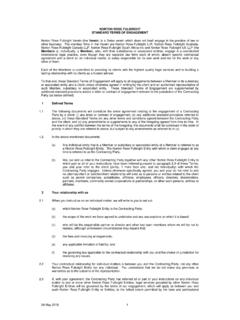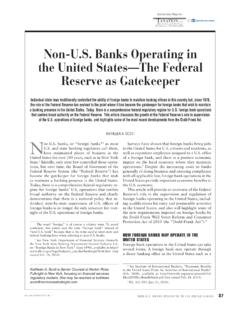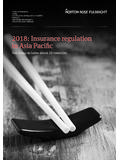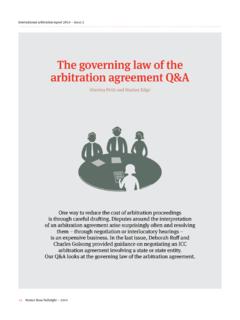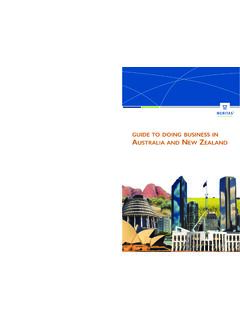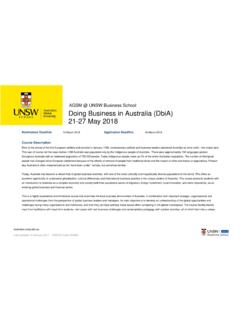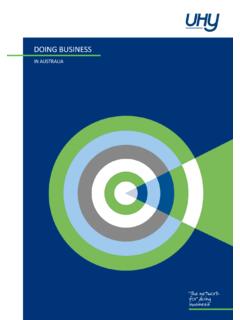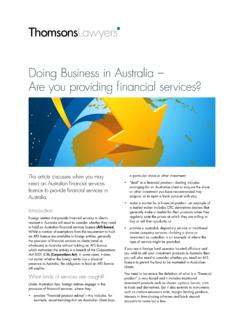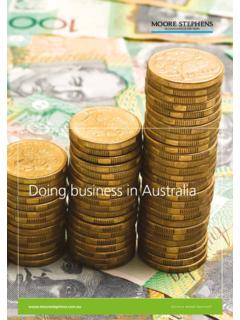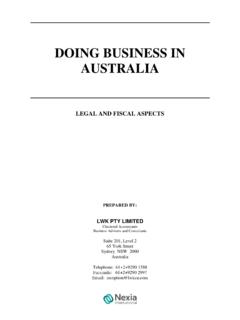Transcription of Doing Business in Asia Pacific - Norton Rose Fulbright
1 Doing Business in australia APAC-#36979822-v4 Doing Business in asia Pacific December 2016 Financial institutions Energy Infrastructure, mining and commodities Transport Technology and innovation Life sciences and healthcare APAC-#36979822-v4 Doing Business in asia Pacific A Norton Rose Fulbright guide Norton Rose Fulbright wishes to thank the following personnel who have contributed to the 2016 edition of this publication: Lead editor and contributor of the Australian chapter Michael Joyce, Partner, Sydney Assistant editorial and production team Alice Winter-Irving, Associate, Sydney Greg Vickery, Special Counsel, Brisbane Marnie Payne, Senior Business Development Manager, Sydney Other key contributors from our Norton Rose Fulbright offices.
2 australia Georgina Hey, Partner, Sydney Fadi Khoury, Partner, Sydney Jason Noakes, Partner, Sydney China Ms Fei Kwok, Partner, Beijing Hong Kong James Parker, Partner, Hong Kong Indonesia Shamim Razavi, Partner, Sydney and Senior Foreign Counsel of TNB & Partners (associate office of Norton Rose Fulbright ), Jakarta Singapore Craig Loveless, Partner, Singapore Thailand Sarah Chen, Of Counsel, Bangkok Our thanks also go to all of the many others who assisted with the production of this publication. The law in referred to in this publication is as at 1 May 2016 unless otherwise stated. Whilst every effort has been made to ensure the accuracy of this publication, it is for general guidance only and should not be treated as as substitute for specific advice.
3 If you would like advice on any of the issues raised, please contact the relevant Norton Rose Fulbright office. Norton Rose Fulbright , 2016 - 2 - Norton Rose Fulbright also wishes to extend its special thanks to the law firms below for their contribution to the production of the 2016 edition of Doing Business in asia Pacific : India Cyril Amarchand Mangaldas Indonesia TNB & Partners (associate office of Norton Rose Fulbright ) Japan Anderson Mori & Tomotsune Malaysia Skrine Myanmar DFDL New Zealand Parry Field Lawyers Philippines SyCip Salazar Hernandez & Gatmaitan South Korea Barun Law LLC Taiwan Alliance International Law Offices Vietnam Vision & Associates - 3 - Preface Doing Business anywhere in the asia Pacific region is extraordinary.
4 At times the challenges can be immense, but so too the rewards. The region is dynamic, entrepreneurial and, now, fully entitled to claim its place on the world stage as the principal driver of global economic and Business growth. There is nothing that can compare with the excitement of concluding a successful transaction, establishing a new Business , or developing a new project in any one of the jurisdictions here. One deal leads to another, relationships accumulate, and layer upon layer of knowledge and trust are developed over time. Norton Rose Fulbright has been active across the asia Pacific region for several decades now. This is the 11th edition of Doing Business in asia Pacific we have produced at the behest of our clients, who have been very clear that this comprehensive guide to Doing Business in the region is something they value.
5 All of the facts are here in this publication. We cover visas and work permits, types of Business entities, Business environment, policy on foreign investment, government initiatives, government incentives, taxation, workplace relations and the means to forestall or resolve disputes. This edition of Doing Business in asia Pacific was published in 2016. It bundles up our local market knowledge, our emphasis on quality and our geographic reach to provide you with a key reference source. It is the distillation of the knowledge of dozens, if not hundreds, of our professionals across the region. We wish you great success in all your Business dealings in asia Pacific , and would be pleased to provide additional information and advice about any of the issues discussed in this guide.
6 Regards Michael Joyce Editor and Partner, Sydney Norton Rose Fulbright - 4 - Contents australia .. 5 China .. 22 Hong 42 India .. 55 Indonesia .. 91 Japan .. 100 Malaysia .. 114 Myanmar .. 136 New Zealand .. 155 Philippines .. 166 Singapore .. 179 South 198 Taiwan .. 215 Thailand .. 229 Vietnam .. 241 Norton Rose Fulbright office contacts .. 264 Contributing law firms .. 265 About Norton Rose Fulbright .. 266 - 5 - Doing Business in australia APAC-#36979822-v4 australia Visas and work permits 6 Business entities 7 Business environment 9 Foreign investment policy 13 Government initiatives and incentives 16 Taxation 16 Workplace relations 18 Occupational health and safety 20 Dispute resolution 20 Contributed by Norton Rose Fulbright - 6 - Doing Business in australia Norton Rose Fulbright australia australia is a democratic country which is based on the liberal democratic tradition.
7 australia comprises six states and various territories, which became federated in 1901. There are essentially three levels of government: the federal government; the governments of each state and territory; and local governments or councils. Each state in australia has its own constitution, which grants broad powers to make laws for the peace, order and good government of the relevant state. At federation, the states agreed to give up certain law-making powers to the federal government. Those powers are enshrined in australia s constitution, which also provides for the separation of powers between the executive, judicial and legislative branches of government. The federal government is based on a popularly elected parliament with two chambers, the House of Representatives and the Senate (also referred to as the Lower and Upper Houses, respectively).
8 Ministers appointed from these chambers form the executive government. Each state in australia , except for Queensland, also has two houses of parliament. The Australian head of state is the reigning monarch of the United Kingdom. The reigning monarch appoints a Governor-General (on the advice of the elected Australian government) to be the monarch s representative. The Governor-General has wide powers, but generally only acts on the advice of ministers on virtually all matters. In each state, the monarch is represented by a Governor. australia welcomes and encourages foreign investment, particularly direct investment, which will foster export-orientated, internationally competitive industries. Joint ventures and new enterprises which will diversify the Australian economy are especially welcome.
9 Foreign capital plays a fundamental role in the development of australia s industries and resources. Foreign investors, both in partnership with local companies or on their own account, are readily able to pursue opportunities in australia . Visas and work permits Visas for Business people and skilled people The Commonwealth government manages the entry and settlement of people through the Department of Immigration and Border Protection (DIBP). Australian immigration policy requires all non-citizens wishing to enter australia to hold a visa. Business people have a number of visa options, depending on the purpose of their entry into australia . Business visas are broadly grouped into Business visit visas, provisional (temporary) Business visas and permanent Business visas.
10 Skilled people also have a range of temporary and permanent visa options. For people seeking permanent residence in australia , temporary visas in both the Business and skilled categories provide a pathway to permanent visas. It is important to note that it is becoming increasingly difficult for people over the age of 45 to obtain permanent residence in australia in both the Business visa and skilled workers visa categories. Furthermore, the processing times, application fees and location of application vary between visa subclasses. Business visits Business people may wish to visit australia for a range of reasons - to explore opportunities, conduct Business negotiations, attend conferences or seminars or conduct Business with an Australian based organisation.


